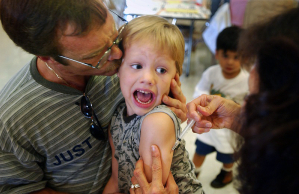
Measles was once declared eradicated in the United States at the turn of the 21st century. However, the latest outbreak of this virus has left California schools in the San Francisco Bay Area scrambling to notify parents to immunize their children.
The initial outbreak, which started in the Disneyland theme park in Southern California, has made its way into the Bay Area, with confirmed cases in Alameda County, San Mateo County and Santa Clara County. According to a statement released by the California Department of Public Health, the presence of measles has been confirmed in 59 residents since late December 2014.
"Of the confirmed cases, 42 have been linked to Disneyland or Disney California Adventure Park in Anaheim," CDPH said. "The confirmed cases include five Disney employees; four of whom worked at the parks and one who is believed to have been infected as a guest."
The Gospel Herald has received an email on Friday from assistant superintendent Karen Robinson in regards to the measles outbreak. She stated that while the cases in Santa Clara County had no links to Disneyland, she warned that "measles may be circulating undetected in our community, although we don't know how widely."
"We want to reassure parents that there is no need to be alarmed," Robinson said. "If your children have been vaccinated, they are protected from catching measles."
However, as a reminder, she urged everyone "to make sure that they are either immune or have been vaccinated against measles."
As for the cases in the Bay Area, the health department told Lisa Fernandez of NBC Bay Area that seven cases have been confirmed. Three people in Alameda County became infected after their visit to Disney theme parks in Orange County.
Health officials stressed to Fernandez that "the people who have measles in San Mateo and Santa Clara counties are not related to the Disney outbreak."
The CDPH issued guidelines to healthcare professionals in tackling the latest outbreak, including the symptoms associated with the measles virus infection.
"Consider measles in patients of any age who have a fever and a rash regardless of their travel history," CDPH wrote. "Fever can spike as high as 105 degrees Fahrenheit. Measles rashes are red, blotchy and maculopapular and typically start on the hairline and face and then spread downwards to the rest of the body."
The Centers for Disease Control and Prevention elaborated on its website on how measles spreads in an unvaccinated population.
"The virus is highly contagious and can spread rapidly in areas where people are not vaccinated," the CDC wrote. "Worldwide, an estimated 20 million people get measles and 122,000 people die from the disease each year-that equals about 330 deaths every day or about 14 deaths every hour."
The CDC added that thanks to the widespread use of the measles, mumps and rubella (MMR) vaccine in the United States, it has resulted in "a greater than 99% reduction in measles cases compared with the pre-vaccine era."
"From 2000 to 2013, a range of 37 to 220 measles cases per year were reported in the United States, and most of these originated outside the country," the CDC reported.
However, efforts to put measles in the history books have been hampered by growing numbers of California schoolchildren who lack proper vaccinations. According to Fernandez, "the rate of parents filing 'personal belief exemptions' to allow their children into school without being fully immunized has doubled since 2007," which may have been a big factor in the current outbreak.
The CDC recommended that all children older than 12 months get two doses of MMR vaccine, with the second dose taken at least 28 days after the first dose.







